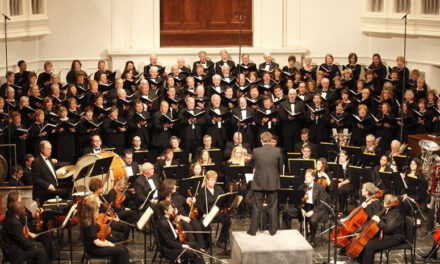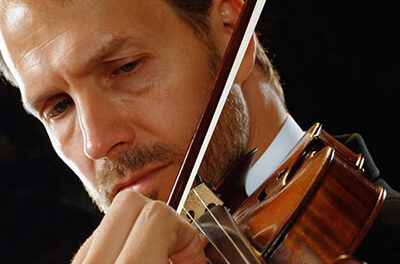The performing arts facilities of the University of North Carolina at Greensboro were festooned throughout 2014 with banners touting the 450th anniversary of the births of Galileo Galilei (1564-1642) and William Shakespeare (1564-1616). While it missed the exact year, the staging of the 18th opera of Philip Glass (b.1937), Galileo Galilei (2002), was still a most apt choice. The opera, which premiered in 2002 at Chicago’s Goodman Theatre, is receiving its first university staging, with everything from sets, lighting, direction, singing, and musicians being drawn from the School of Music, Theatre, and Dance. The first of three performances took place in the beautifully restored Aycock Auditorium.
Galileo Galilei, an opera in ten scenes, played without interruption, lasts about 93 minutes. The libretto was prepared by famed director Mary Zimmerman in collaboration with Philip Glass and Arnold Weinstein.
This synopsis is from Glass’ webpage. “Drawing from letters of Galileo and his family, and various other documents, this opera retrospectively journeys through Galileo’s life. Opening with [the astronomer] as an old, blind man, after the trial and Inquisition for his heresy, it explores his religiosity as well as his break with the church, and expands into the greater oscillating relationship of science to both religion and art, reaching its end with Galileo – as an infant – watching an opera by his father.”*
Key to the success of this UNCG production of the opera is the very effective and imaginative unit set designed by Randall McMullen, made all the more dazzling by lighting designer Ken White. Part of the stage projects over about half of the orchestra pit. The back stage has a semicircular unit with open spaces within it and with a broad walkway across its top. Anchored firmly in the center of the effectively circular performing space is a stair that is readily moveable and constantly rotates, allowing the fluid movements of the singers. The active blocking by stage director David Holley keeps the opera, so much derived from documents, from being static. Besides a constant shifting of the lighting, the back of the stage and much of the hall’s ceiling are covered with projected lights representing stars. The rich, evocative period costumes, designed by Trent Pcenicni, an experienced theatre hand and currently an undergraduate at UNCG, are excellent.
Glass’ score calls for two sopranos, one mezzo-soprano, a countertenor, a tenor, a bass-baritone, and three baritones. Holley’s fine all-round cast of some dozen student singers involved some doubling and tripling of roles.
The role of Galileo is divided between two singers. Tenor Derek Jackenheimer as the aged Galileo sang with firm and even voice and projected with excellent diction. He conveyed the weight of the astronomer’s emotional turmoil superbly from scenes 1-4. In scenes 6-9, the young Galileo was ably sung by baritone Derek Gracy. The non-verbal role of Galileo, as a child, was ably acted by first grader Evan Reich.
Soprano Adrienne Leggett sang the prominent role of Maria Celeste, Galileo’s youngest daughter, as well as the brief role of Merope, the daughter of Oenopian, in scene 10, an opera based upon Greek mythology by Galileo’s father, Vincenzo Galilei. Her voice was very brightly focused for the high tessitura of the role of Mary Celeste, most extensively in Scene 3, “Pears,” dramatizing her letters to her father from a convent over several years.
The important role of Cardinal Barberini, the friend of the young Galileo, who, as Pope Urban VIII, failed him during the Inquisition, was sung by bass-baritone Deon’te Goodman. His solid and well projected voice has a fine tone. He also sang the role of Simplicio in Scene 5, the “Dialogue Concerning the Two Chief Systems of the World.” This excerpt from Galileo’s book led to his trial when his enemies convinced Pope Urban VIII that he was represented by Simplicio. The other two roles in this scene are Sagredo, sung by soprano Lydia Pion, and Salviati, sung by baritone Derek Gracy. Pion’s warm tone was also welcome as Eos, the goddess of dawn, in the final scene.
Scene 6, “Inclined Plane,” is the most problematic. No supertitles were used in this complicated reconstruction of one of Galileo’s most important experiments, the measurement of the falling of different weights along an inclined plane utilizing one banister of the ubiquitous stairs. It is doubtful how much of the complex dialogue could be followed by non-physicists!
The other banister of the stairs played a central role in scene 9, “The Presentation of the Telescope” to three prominent ladies, Maria Maddalena, firmly sung by mezzo-soprano Natalie Rose Havens, and Maria de Medici and Duchess Christina, sung by sopranos Lydia Pion and Holly Curtis, respectively. The telescope, much larger and longer than the original, was affixed to the stairs’ left banister.
The Duchess Christina and Galileo recall that they both, as children, witnessed Galileo’s father’s opera. The role of the Duchess as a child in scene 10 was suitably portrayed by first grader Sarah Geraldi.
The most all-round impressive voice was that of counter tenor Matthew Reese, who sang the role of the first Cardinal in scene 2, “Recantation,” Father Sinceri (Inquisitor no. 2) in scene 4, “The Trial,” and Oracle 1 in scene 10, the “Opera within Opera.” His diction and projection were superb, and his voice had “weight” and good full and even tone.
Conductor Kevin Geraldi secured attentive and committed performances from his pit orchestra of some 22 players. The percussion section often played an important role in Glass’ accessible score. The usual pulsations and short repetitions are combined with surprisingly longer melodic lines. There were prominent solos from bassoonist Kirsten Gray (in scene 4), trumpeter Donnie McEwan (scenes 1 & 2), flutist Janet Phillips (scene 5), and clarinetist Graham Dart (scene 9). The low sustained horn notes of Corinne Policriti were a delight in scene 1.
*The father’s music lives on as one of the works set by Respighi in the Ancient Airs and Dances.
The opera will be repeated April 17 and 19. For details, see the sidebar.












